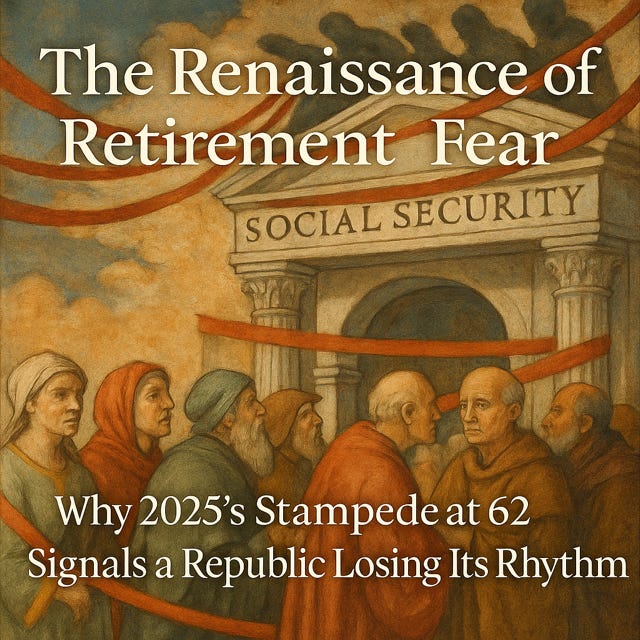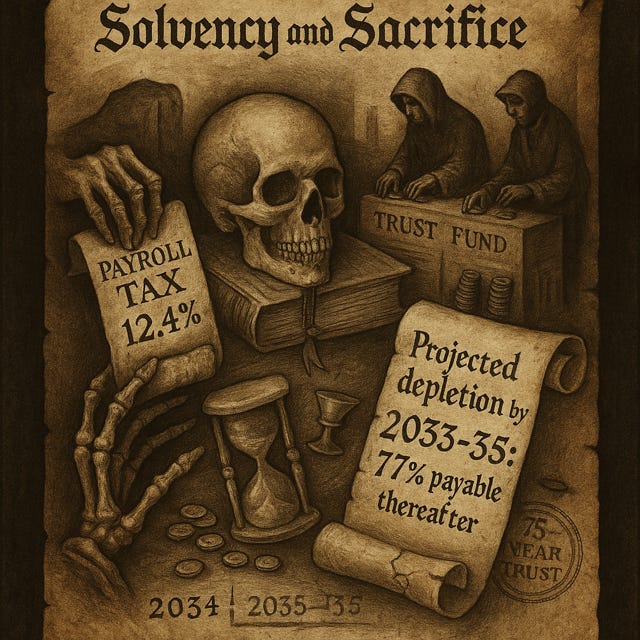The Renaissance of Retirement Fear: How Political Uncertainty Undermines Long-Term Thinking
Cosimo’s Secret Guardaroba is where the future is plotted, one whispered dispatch at a time.
According to, well, every media outlet ever, but this from the New York Times: the news that Social Security’s insolvency has been moved forward and now will see steep and automatic 23% cuts across the board by 2033 has been met with a continuation of virtually the same “policy” as this regime had six months ago: fear.
The Financial Times last month put it best with its headline: “Donald Trump’s ‘Marie Antoinette moment’: call for national sacrifice falls flat.”
So. This fear of the unknown. Fear what he will do next. Fear if there will even be a government by 2033. Nothing is certain. And that’s the policy: the more we fear the more we blame. The more we blame the more divided we are. The more divided we are the less we see or care about the rampant corruption and cruelty inflicted by those in power. So, here we go, with yet another call to reboot the republic.
The Stampede at Sixty-Two
They were supposed to be the most confident class of retirees in American history.
Double-income boomers. Home equity heroes. Survivors of dot-com crashes, Wall Street meltdowns, and COVID shutdowns. The 62-year-olds of 2025 weren’t stumbling blindly into old age—they had spreadsheets, savings, advisors, and actuarial charts.
And yet—they fled.
Between January and May 2025, the Social Security Administration reported an 18% surge in retirement claims compared to the same stretch in 2024. Not during a market collapse. Not in response to a pandemic. Not even during a categorized recession. These early filings were powered by something even more potent than pain: anticipation.
“It’s a very consequential decision,” said Kathleen Romig, senior analyst at the Center on Budget and Policy Priorities. “It can mean hundreds of dollars every month and many thousands of dollars over your lifetime.” NPR, June 12, 2025
Yet, in Berthoud, Colorado, Bill Armstrong—62, out of tech work, recovering from cancer—made his move early. “I better get in the system before they move that age higher,” he also told NPR. “We all paid into those things. In my case, 42 years now.”
His decision wasn’t driven by hardship alone, it was driven by doubt. Doubt about whether the system would still be his by the time he reached 67. Doubt reinforced by facts, but those have been around for decades. The doubt now is influenced by something stronger: political signals.
Armstrong is not alone. Across the country, people who planned to wait until 70—when benefits peak—filed early. Not out of ignorance, but out of dread.
They knew the cost.
They filed anyway.
Because the tune changed. And quickly.
Regimes of Rumor

Retirement ages haven’t been raised, yet. There was no act of Congress specifically calling for cuts in the Big, Beautiful, Boondoggle. No midnight vote, no broken promise.
But that doesn’t matter.
The Trump-DOGE-Fox regime didn’t need to pass sweeping legislation. All it took was a whisper campaign delivered through executive channels, media leaks, and algorithmic assassination. They said they would “audit” SSA for fraud. They demanded access to its source code. They elevated administrators with no public trust. They slashed staffing, collapsed call centers, and hinted—loudly—at “saving” the program by transforming it.
Under DOGE, SSA has closed its Office of Civil Rights and Equal Opportunity and Office of Transformation, both meant to usher in innovation and fairness in the system.
Keep reading with a 7-day free trial
Subscribe to Reboot The Renaissance: Medici iOS Settings to keep reading this post and get 7 days of free access to the full post archives.






